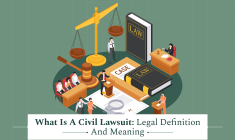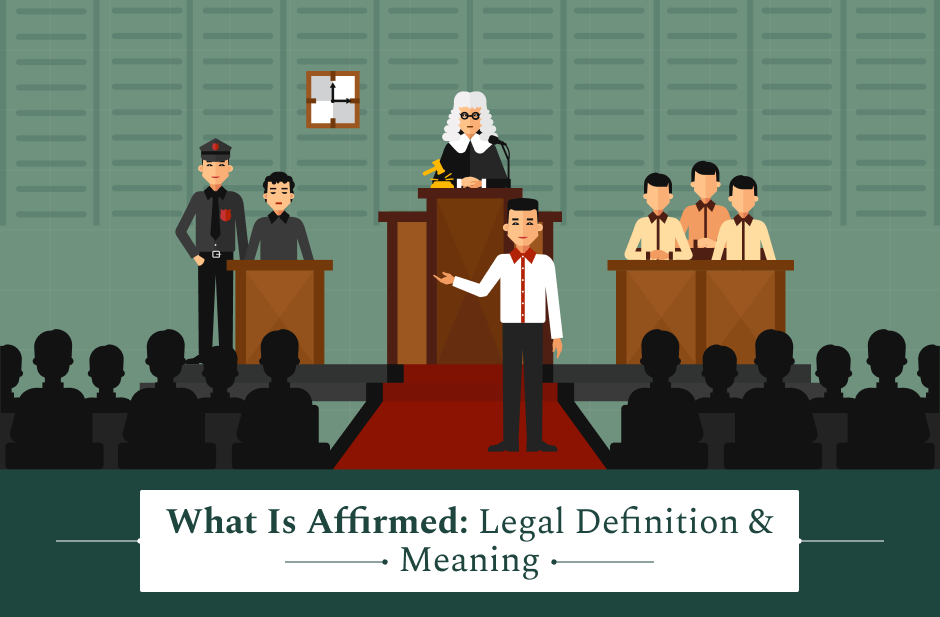In legal settings—especially in appellate law—the term affirmed frequently appears in decisions rendered by higher courts. But what exactly does it mean when a judgment is “affirmed”? Why does an appellate court sometimes affirm rather than reverse or remand a decision?
In this article, I will talk about the following things:
- What is affirmed?
- What are the different types of affirmation?
- The key aspects of the affirmed verdict.
- What is the legal impact of such a verdict?
Additionally, I will also address some of the most common questions that people often ask about when searching for the meaning of the term affirmed. Therefore, if these are some of the things that you want to know, keep on reading this blog till the end…
What Is Affirmed?
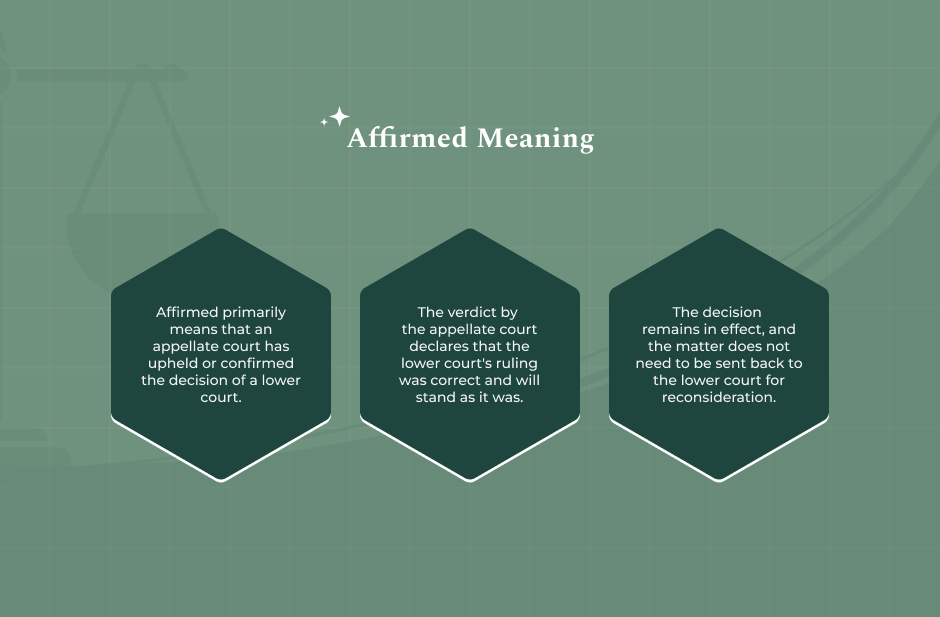
First things first, what is affirmed?
“The action by an appellate court agreeing that the decision made by the lower court is correct” is called affirmed, according to Justia’s Dictionary.
This means that a decision affirmed means that a higher court (usually an appellate court) has reviewed the decision of a lower court (trial court or tribunal) and determined that the decision was legally correct, free of reversible error, and thus should stand as is.
In other words, the appellate court does not change the outcome; it upholds the judgment or order of the lower court. According to Kupferman & Golden, the affirmed decision becomes final (at least for that stage of appeal), unless further appeal is available.
“Appeals can be filed after a court has issued a final decision. Temporary orders may not be appealed in most cases, and appeals must be based on a belief that some error was made by the courts.”
The Legal Information Institute mentions that an “appellate court can affirm a previous ruling from a lower court, meaning it agrees with the lower court’s ruling on the subject of the appeal.”
What Are The Types Of Affirmed?
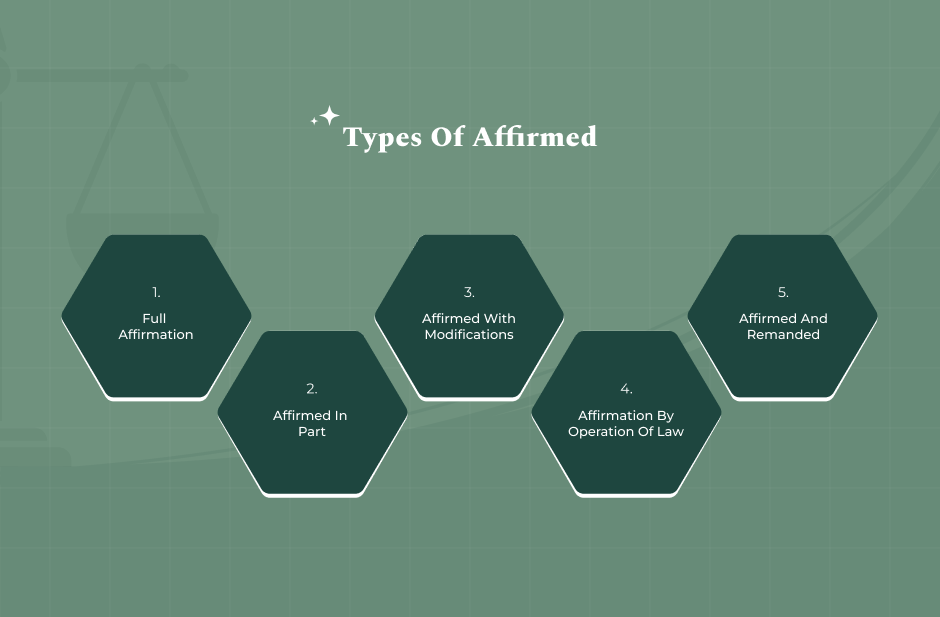
“Affirmed” most of the time means that the lower court decision has been upheld in its entirety. However, there are different kinds or specific forms of affirmation. Some of the variations are:
1. Full Affirmation:
The court of appeals positively acknowledges everything in the decision of the lower court: the way the facts have been established, the legal approach, orders, relief, etc., with no changes.
2. Affirmed In Part:
Those are the points of the lower court decision that are confirmed, while the rest may be overturned or the case is returned for reconsideration.
For instance, according to Hegge & Confusione, LLC, it could be that the trial court’s decision about the question of the lawsuit is confirmed, and the court’s way of calculating the damages is overturned.
3. Affirmed With Modifications:
In such a case, the court of appeals supports the judgment, but they are allowed to change some aspects of the decision. For example, a sentence may be adjusted, the wording changed, or some orders altered while the core judgment remains unchanged.
This may be referred to as partial confirmation or confirmation with instructions to amend minor legal or procedural issues, depending on the jurisdiction.
4. Affirmation By Operation Of Law:
At times, a decision becomes an affirmed one if there is nobody who can or wants to appeal it, or the appeal is dismissed because of procedural issues, so the decision of the lower court remains unchanged.
5. Affirmed And Remanded:
Though the term “affirmed” strongly implies that no changes will be made, it is still possible that the appellate court identifies some aspects of the decision that could be confirmed.
Additionally, at the same time, areas that are suitable for a remand back to the lower court for further examination or discussion.
Consequently, the case is partially decided in the court of appeals, and the rest is referred back to the lower court for continuation of the proceedings.
Note: These types depend heavily on the rules of the relevant jurisdiction.
What Are The Key Aspects Of An Affirmed Decision?
Several legal principles and characteristics distinguish what makes an affirmation valid:
- Standard of Review: Appellate courts do not re‐try the case or consider new evidence typically. They review the record, transcripts, and the law applied. Deference is given, particularly to findings of fact, unless clearly erroneous. Legal errors or significant procedural errors, however, can lead to reversal.
- Scope of the Appeal: Only issues raised by the appellant (arguing the lower court was wrong) are considered. If the appellant did not preserve certain issues, those may be “waived” or not reviewed.
- Precedent & Legal Principles: Affirmation usually implies that the law and precedent have been correctly applied in the lower court’s judgment.
- Finality (often): Once affirmed, the decision typically becomes final for that level. It may affect enforceability (e.g., enforcement of a judgment), prevent further appeal or limit chances of success in further appeal.
- Effect on Costs, Orders, Relief: The affirming court decides whether any orders of the lower court on costs or specific relief must be carried out as agreed. The affirmed decision also indicates that those orders are valid.
How Does Affirmed Happen?
Now that you know what is affirmed, you need to understand how this works, or the general process of such a verdict.
Here are the things that happen after which a decision becomes affirmed by the appellate court:
Filing Of The Appeal:
The process that typically follows a judgment or an order issued by a trial court is the filing by the losing party of a notice of appeal (or its equivalent) to a higher court. Most of the time, they are obliged to do it within a certain timeframe and adhere to the procedural requirements.
Preparation Of Record:
The court of appeals is supplied with the record: transcripts, pleadings, evidence, lower court’s findings, briefs by both parties, and possibly oral argument.
Appellate Review:
The higher court looks into whether the lower court has made a mistake in law. For example, this can be the result of some of the following things:
- Wrong application of the law.
- Not having the jurisdiction.
- Violating due process.
- Making a mistake in admitting or excluding evidence.
- Giving the wrong instructions to the jury.
Decision Of The Appellate Court:
The appellate court decides to either confirm the lower court’s decision, revoke it, send the case back to the lower court for another trial, or combine different options. The court returns the decision that is appealed against as being without reversible errors, thus confirming it.
Opinion Or Order Issue:
The court issues a written opinion or order explaining its reasoning. When a decision is affirmed, the opinion may be brief (e.g., summary affirmance) if standard matter, or detailed if contested legal issues are involved.
Mandate/Execution:
When the higher court has affirmed the lower-court decision, it then issues a mandate or a formal order. Next, the parties are obligated to follow the court’s decision (e.g. in the case of a judgment, the stage of enforcement, or where orders are being carried out).
What Are The Legal Impacts Of An Affirmed Verdict?
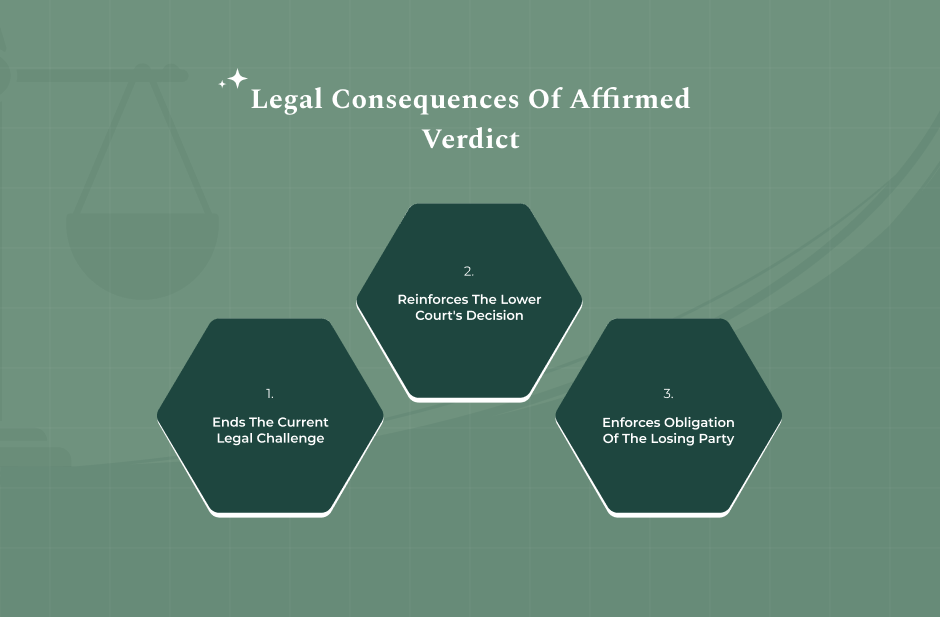
According to Kupferman & Golden, “If your appeal is affirmed, you may file a petition to have your appeal reheard by the appellate court. You need to file your petition within 30 days after the court has made its decision.”
Additionally, your lawyer can help you understand what steps you need to take and guide you to fill in all the information before the deadline. After that, the “appellate court will then decide if your case will be reheard.”
Now, an affirmation has several consequences, both for the parties and for the broader legal system. Here are the legal impacts that you need to know:
Read Also: What Is An Acquittal: Legal Definition & Meaning
1. For The Parties:
Here are two things that you need to keep in mind:
- Winning party: Their victory is validated; they can enforce the judgment.
- Losing party: Their arguments have been rejected; their options for further appeal may be limited. They may bear costs, including legal fees or appeal costs.
2. Precedential Value:
Affirmed opinions (especially published ones) contribute to case law. They may be cited in future cases as binding or persuasive precedent.
3. Finality & Legal Stability:
An affirmed decision contributes to legal certainty: once reviewed, the legal principles in that case are confirmed.
4. Procedural Closure:
It often ends that particular line of appeal—unless a higher appeal is available, or exceptional circumstances (e.g., constitutional issues, newly discovered evidence).
5. Possible Enforcement Of Orders:
Once affirmed, orders, damages, sentences, etc., can be enforced. For criminal cases, affirmed convictions carry consequences; for civil cases, affirmed monetary judgments or injunctions bind the losing party.
Limitation Of Further Review: A Consequence People Forget
Affirmation limits grounds for seeking further review (e.g., in a supreme court or special court). Sometimes, appellate courts’ affirmations may discourage further litigation because the chances of success are lower once a higher court has accepted the lower court’s decision.
Frequently Asked Questions (FAQs):
Here are some of the questions that people also ask when they are searching for the legal meaning of what is affirmed. Take a look at them before you go:
1. Does “Affirmed” Mean The Lower Court Made No Mistakes At All?
Not necessarily. It means that no reversible error was found—that is, no mistake significant enough under law to require the higher court to change the outcome. Minor or harmless errors that don’t affect the overall result may be tolerated.
2. Can An Affirmed Decision Be Challenged Further?
Yes—if there is a higher court with jurisdiction, or in exceptional circumstances (e.g. constitutional issues, jurisdictional errors). But the hurdle is generally higher if an appellate court has already affirmed.
3. Is “Affirmed” The Same As “Dismissed”?
No. Dismissal usually means the case or appeal is thrown out (perhaps on procedural grounds) without a ruling on the merits. Affirmation means a ruling on the merits is reviewed and upheld.






